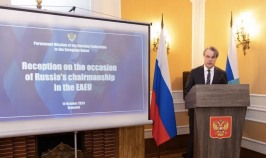Distinguished Guests, Your Excellencies,
I am glad to welcome you to our event marking Russia's chairmanship of the EAEU bodies this year. We hope that by the end 2023 we will be able to take stock of the results of our presidency, which will reflect our common work, carried out in the interests of all EAEU member countries, to implement the priorities we set forth in late 2022. As you know, they cover such areas as digitalisation of the economy, development of cooperation in the field of information and communication technologies, and, which is fundamentally important, progress towards technological sovereignty. To fulfil this strategic objective, it is necessary not only to continue implementing projects in various areas that are mutually beneficial to our countries, but also to do it in a way that reduces dependence on the mechanisms of international economic relations controlled by a narrow group of players, including "reserve currencies". And the results are already very tangible: in 2022, 76% of mutual settlements and trade between EAEU member countries were carried out in national currencies or those of friendly states, and this year the share tends to expand even further.
When we created the EAEU, this was obviously not one of our tasks. I would emphasise that the legal framework of the Union was built on the norms of the WTO agreements, and the best international practices in the functioning of economic integration associations were used in the shaping of the EAEU. By the way, next year we will celebrate the tenth anniversary of our integration association. I would recall that when the Eurasian Economic Union was conceived, there was much talk about an “integration of integrations”, that is, harmonisation of regional economic projects to be based on universal transparent principles of international trade and aimed at preventing the unbalancing of the existing system of trade and monetary relations.
Unfortunately, the West's actions have disrupted the movement in this direction, and now more than ever it is necessary to protect ourselves from arbitrary decisions of third parties. Today, Russia is the main target of the US and EU sanctions pressure, but it is obvious that tomorrow virtually any actor may be subject to it. Belarus is another state of the five EAEU members affected by sanctions.
Well, let us get back to something positive. Today, the Eurasian Economic Union is a dynamically developing integration association. Much work has been done to remove trade barriers within the Union, we have harmonised our standards, adopted regulation to prevent distortion of competition through subsidies, established a common market for government procurement and pharmaceuticals, etc. Integration potential in transport, logistics and energy continues to be developed.
Our progress can also be seen in the statistics. For example, mutual trade continues to increase every year: in 2022, intra-Union trade rose by 14% compared to 2021. In the first six months of 2023, the growth was already 11.1%. The main socio-economic indicators also enjoy steady improvements, despite the difficult external environment. Under pressure from the West, efforts are being made to reorient trade: it is shrinking with "Westerners" and expanding with other partners.
Food remains a key trade item both within and outside the EAEU. In 2022, intra-Union trade in food increased by 31.7%, and this year a further 10.8% was added. Last year, the EAEU external trade in food went up by 9.8%, and this year it has already risen by 18.9%. Thus, our significant contribution to ensuring global food security is evident.
The situation in the manufacturing sector has not been the easiest so far, certain obstacles still remain. Yet, we can say for sure that there is no decline in industrial production. Growth is recorded in all countries of the Union, new supply chains are being created, and joint projects are running.
The EAEU is also actively fostering its international coooperation. Trade agreements have already been concluded and are implemented with a number of countries – Vietnam, Iran, China, Serbia and Singapore. The Union’s mutual supplies with these states are growing, and with some countries they have more than doubled, for example, with Iran and China. With other partners, the figures are a little more moderate, but in any case, our trade turnover is increasing. And this testifies to the mutually beneficial nature of our cooperation.
Negotiations on free trade agreements are ongoing with other states – Egypt, Israel, India, Indonesia, and the UAE. A full-fledged arrangement with Iran has already been finalised and preparations are underway for its signing.
We engage in a systemic dialogue and have signed memorandums of cooperation with a number of associations – CIS, SCO, ASEAN, Mercosur and others.
Thus, the EAEU is keeping pace with the times. The Union's agenda includes the development of common approaches in the trade and climate sphere. In this context, the short-term task is to avoid the emergence of internal barriers and maintain the competitiveness of the EAEU economies, taking into account technological transformation, to create conditions for joining efforts and for cooperation within the framework of climate projects. It is important for us to ensure that countering climate change does not threaten the effective development of our integration association and does not serve as a pretext for restricting its foreign trade.
To conclude, I would like to stress that the EAEU is open for dialogue to strengthen cooperation on a mutually beneficial basis in all areas of economic and trade policy. We develop relations with everyone who develops relations with us. It is, of course, about equal, partnership and mutually beneficial relations.
Thank you for your attention.























